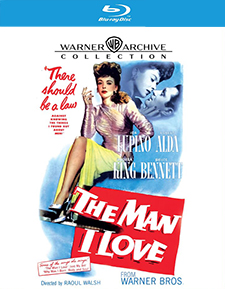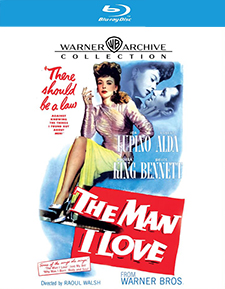Man I Love, The (Blu-ray Review)

Director
Raoul WalshRelease Date(s)
1947 (June 25, 2024)Studio(s)
Warner Bros. (Warner Archive Collection)- Film/Program Grade: B-
- Video Grade: A
- Audio Grade: A
- Extras Grade: C
Review
There are musicals, crime films, dramas, but few movies that combine all these genres as director Raoul Walsh does in The Man I Love. With its smokey nightclubs, a tough chanteuse, a well-tailored bad guy, and two vulnerable families under stress, the film is an interesting example of post-World War II features in which an independent, self-assured woman is the central character.
The film opens in a small New York City jazz joint, with the musicians jamming as singer Petey Brown (Ida Lupino, High Sierra) gives her distinctive rendition of the Gershwins’ title song. Petey is confident, well liked, and accustomed to getting by on her own talent, allure, and drive. With Christmas in the air, she’s also feeling homesick, so she heads for California to surprise her family—two sisters, Mrs. Sally Otis (Andrea King, The Very Thought of You) and overly shy teenager Ginny Brown (Martha Vickers, The Big Sleep); a brother, Joe Brown (Warren Douglas, Task Force); and Sally’s son, Jimmy Otis (Jimmie Dodd).
What she finds is not a picture-postcard version of small town life but a family in crisis. Petey discovers that Sally, Joe, and their neighbor’s wife are involved in various ways with nightclub owner Nicky Toresca (Robert Alda, Rhapsody in Blue)—handsome, slick, shady, and the very definition of a cad. Sally works as a waitress in Nicky’s club and he’s fascinated by her. Sally’s husband (John Ridgely, A Place in the Sun) is a war hero currently in a veterans hospital, being treated for what we now call PTSD. Joe also works for Nicky, but not in the strictly legitimate areas of Nicky’s business.
Sally and Ginny often babysit for the twin infants of their neighbors Johnny O’Connor (Don McGuire, Possessed) and his wife, Gloria (Delores Moran, To Have and Have Not). Johnny works at night and Gloria, feeling lonely, is out a lot visiting “friends.”
Seeing that her family is having troubles, Petey decides to stay around a while and try to help work things out. She’s hired by Toresca to sing at the club and he soon falls hard for her. She, however, is attracted to down-and-out jazz pianist San Thomas (Bruce Bennett, The Treasure of the Sierra Madre). The screenplay interweaves these stories with Petey at the center of each as her confidence and strength drive her to resolve the problems of her own family and the O’Connors as well as her feelings for San.
The film is slick soap opera with a touch of noir, benefiting from Lupino’s performance. Her Petey is resilient, tough, smart, and well able to handle adversity. She was always a reliable actress, and in this film she has a strong role and makes the best of it. Her character’s fortitude contrasts with the weaknesses of her sisters and brother. Her bearing, walk, and dialogue portray Petey as proud and impossible to intimidate.
Director Raoul Walsh moves the film along briskly and keeps the visuals interesting by using several different locations. Though The Man I Love is not technically a musical, there’s a lot of music in it, including the title song, Body and Soul, Why Was I Born?, and Bill. Lupino does an expert job of lip syncing to the voice of Peg LaCentra. In one close-up, watch how Lupino times an exhale of cigarette smoke between verses of a song.
Bennett turns in a haunting performance as the troubled artist. His chemistry with Lupino isn’t great, but she makes her infatuation with San believable.
Alda has fun with his role as the silky smooth operator with a suggestive smile and a disturbing leer. Softspoken and well tailored, his Toresca is an operator who has a constantly wandering eye seeking out new, attractive women. Petey recognizes him for what he is and isn’t taken in by his smarmy charm.
King’s Sally is the goody-goody character and seems a bit much. She hasn’t had the experiences that older sister Petey has had, and is basically a small-town girl. Though she, Lupino and Vickers are supposed to be sisters, they look nothing alike.
The various problems Petey’s siblings are facing drift in and out of the film when the focus becomes Petey’s repeated attempts to bolster depressed San’s ego and convince him of his worth and the bright future they could face together if he would emerge from his self-imposed gloom. Their romance is less interesting than the problems of Petey’s family, and this is where the emphasis should have been.
The Man I Love was shot by director of photography Sidney Hickox on 35 mm black & white film with spherical lenses and presented in the aspect Academy ratio of 1.37:1. Clarity and contrast on the Blu-ray from the Warner Archive Collection are excellent with no indication of imperfections. Details, such as the musical instruments, decor in Sally’s apartment, Ida Lupino’s dresses, and backlot buildings and signs are well delineated. Blacks are deep and velvety, and complexions look natural.
The soundtrack is English 2.0 DTS-HD Master Audio. English SDH subtitles are an available option. Dialogue is clear and crisp. The songs, both vocal and instrumental, are well rendered and have a full, dramatic sound. Ambient club noise is effectively balanced with dialogue and music to provide a realistic nightclub vibe.
Bonus materials on the Blu-ray release from Warner Archive include the following:
- Rabbit Transit (8:05)
- Crowing Pains (6:50)
- Original Theatrical Trailer (2:16)
(The Blu-ray incorrectly states that the cartoons Roughly Squeaking and Slick Hare are included.)
Rabbit Transit – This 1947 Technicolor Looney Tunes cartoon directed by Friz Freleng is the last of three Bugs Bunny vs. Cecil the Turtle road race shorts, and is a spoof of the fable The Tortoise and the Hare. Bugs is shocked reading the Aesop fable about the tortoise beating the hare. At the sauna, where both Bugs and Cecil are lounging, Bugs once again makes the bet, this time offering to give Cecil the post position, spot Cecil 100 yards, and run backwards with his hands tied behind his back. Cecil takes the bet because he has a secret advantage. In keeping with the style of Warner Bros. cartoons, there are many sight gags, asides, and funny remarks. Mel Blanc provides the voice characterizations.
Crowing Pains – Henery Hawk is out to get a chicken and has his sights set on Foghorn Leghorn, but Foghorn directs him to another victim—Sylvester the cat. Earlier, Sylvester was seen teasing Barnyard Dog. Believing Sylvester is a chicken, Henery goes after him. After blunders galore, Henery decides to wait until dawn to see who crows, Foghorn, Sylvester, or Barnyard. This 1947 Technicolor Looney Tunes cartoon was directed by Robert McKimson. Once again, the great Mel Blanc provides the voices.
The Man I Love is more about atmosphere than story. The songs contribute significantly to the mood. As far as plot goes, the film has too many characters in too many subplots and it’s often difficult to keep track of who’s who. A more straightforward narrative could have improved the film. Ida Lupino shines and is easily the best thing in the film.
- Dennis Seuling

